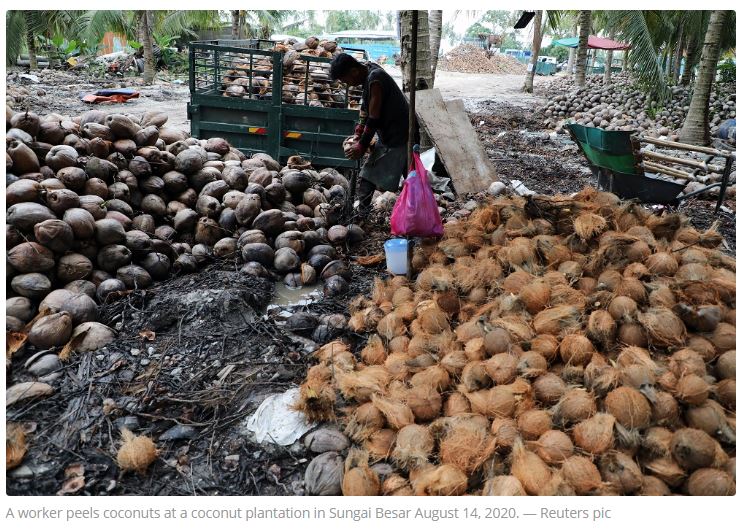Coconut and palm oil industries in Malaysia, other Asian countries at loggerheads over environmental impact
KUALA LUMPUR, Aug 28 — A report highlighting the harmful environmental impact of coconut oil production by a researcher with links to the palm oil industry has sparked a heated debate over coveted green credentials in the multibillion dollar industries.
The palm oil industry has received international negative attention, including consumer boycotts, in recent years for clearing biodiversity-rich tropical rainforests in Southeast Asia in its production process.
Coconut oil, conversely, has been increasing in popularity as a healthy superfood with fewer cultivation concerns.
But a study published in respected scientific journal Current Biology in July appeared to upend that dichotomy, highlighting the impact on native animal species because of coconut oil production deforestation.
The paper said that coconut cultivation threatens 18.6 species per million tonnes of oil produced, nearly five times more than its palm cousin.
The coconut industry, however, was more interested in the lead author of the report, Erik Meijaard, who has carried out work for the global palm oil sustainability body and an Indonesian palm company. Meijaard continues to head the oil palm task force of the International Union for Conservation of Nature (IUCN).
“In the coconut community, [Meijaard’s] article was initially not taken seriously,” Indonesian Coconut Processing Industry Association (HIPKI) secretary-general Donatus Gede Sabon told Reuters. “However, they clearly intend to sneak in a negative campaign against coconuts.”
Indonesia is heavily invested in both industries — it is the world’s biggest grower of palm oil, followed by Malaysia, and is also the world’s second biggest coconut producer, after the Philippines.
Both products are found in everything from cookies to soap, but palm is more widely used as it is cheaper and more versatile. Global sales for palm oil were about US$43 billion (RM179 billion) last year, with coconut oil sales lagging at around US$2.72 billion, according to Reuters’ estimates.
“Production of both crops is destructive when it originates from the wrong areas, such as forests, peatland and high conservation value areas,” said Chandra Panjiwibowo, Rainforest Alliance Indonesia Country Director. “For now, there is much more palm than coconut cultivated globally, and its production is growing much faster, so palm undoubtedly has more impact.”
Estimates by the United Nations Food and Agriculture Organisation (FAO) and industry analysts put global palm oil production at around 75 million tonnes over 20 million hectares, while coconut oil production stands at about 2.91 million tonnes over 12.01 million hectares.
“Taken over the whole area and volume of oil production, oil palm is more than three times as threatening as coconut,” the International Coconut Community (ICC), which represents producing countries, said.
Orangutans and flying foxes
While the impact of the palm oil industry on deforestation and the viability of species like the orangutan has been heavily documented, Meijaard argued there was not enough research into other edible oils such as coconut, olive and soy.
His research linked the extinction of the Solomon Islands’ Ontong Java flying fox, last seen in 1945, directly with coconut cultivation and listed other threatened species such as the Balabac mouse-deer that is endemic to three Philippine islands.
“As long as we don’t understand what more of the other crops means, we should be very careful in saying no to palm, especially because it is the high-yielding crop,” Meijaard told Reuters in a telephone interview from Greece in mid-August.
He denied any bias and said he did not receive funding for the research from the palm oil industry.
In Malaysia, which relies on palm oil for billions of dollars in foreign exchange earnings and hundreds of thousands of jobs, the palm oil council said it worked with coconut oil producers in the region through the Asean Vegetable Oils Club (AVOC) and had no reason to discredit them.
“The question is, why has the campaign to discredit coconuts come back recently,” asked HIPKI’s Donatun. — Reuters
Source: https://www.malaymail.com/news/malaysia/2020/08/28/coconut-and-palm-oil-industries-in-malaysia-other-asian-countries-at-logger/1897877


 English
English




